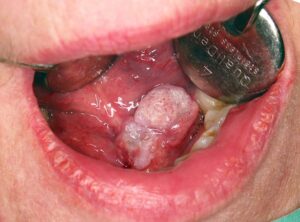The most common types of cancers of the oral cavity occur in the oral mucosa. It is less common in the salivary gland and elsewhere.
The most common symptoms are changes in the oral mucosa. Signs can e.g. be sores that bleed easily and do not heal within a few weeks, red or white lesions, pain or numbness, a lump, swelling or eroded area, difficulty chewing or swallowing or a change in the way your teeth fit together when you closes your mouth. One can be asymptomatic, but soreness and pain, both spontaneously and by touch, as well as in connection with swallowing, may be present. Smoking and excessive alcohol consumption are the main causes. A combination and both have a reinforcing effect. Dental visits are important. If your dentist thinks you have cancer, you will be referred to a specialist. The actual treatment will take place in a hospital, where you either choose radiation treatment or surgery. Studies have shown that a healthy diet with fruits and vegetables can help prevent the development of precursors to cancer.

Chemo- and Radiation Cancer Therapy
The presence of uncontrolled periodontal disease can complicate chemo- and radiation- therapy and vice versa.
Oral complications include dry mouth, inflamed gums, mouth ulcers, infection, difficulty speaking, chewing, swallowing, dental decay, enamel / root erosion, loss of taste sensation, jaw stiffness, delayed healing.
Therefore oral pretreatment is essential to reduce the risk and severity of oral complications and pain, avoid oral surgery and improve overall health.
Daily oral hygiene routine is very important. Brush and floss gently, use fluoride toothpaste, topical fluoride applications may be prescribed, avoid candy and soda unless it is sugar-free. Avoid tobacco and alcohol.
For a sore mouth, rinse with semi-warm water mixed with ¼ teaspoon baking soda and 1/8 teaspoon salt, followed with plain water rinse.
Enamel erosion due to vomiting (gastric acids) can be prevented rinsing your mouth with ¼ teaspoon of baking soda in 1 cup of warm water to neutralize the acid and followed by using a fluoride rinse. Your oncologist may consider prescribing antinausea medication.
Please inform Dr. Hoffmeyer of your therapy.
Contact the dentist as soon as possible
Before cancer treatment: You must pay attention to your teeth if you are diagnosed with cancer in the head / neck region. Radiation therapy can be very harmful to the teeth. To get the best possible prognosis for your teeth, contact us as soon as possible so a plan can be implemented.
After completing cancer treatment: Both the teeth and the environment in the oral cavity may have been damaged, and therefore increases the risk of caries. In some cases, you can get a subsidy for the treatment of dental injuries that result from the treatment. Ask your dentist how to apply for a supplement.
IV Bisphosphonates
Drugs used in treatment of metastatic bone cancer to help decrease pain and fractures, may develop osteonecrosis of the jaw.
It is recommended that you receive a periodontal examination prior to this treatment. This way, if periodontal surgery is needed, it can be performed prior to receiving bisphosphonate therapy.
